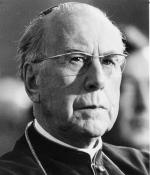Issue Date: March 26, 2004
Last remaining cardinal named by John XXIII was Vatican II luminary By JOHN L. ALLEN JR. Cardinal Franz König, the last remaining cardinal named by Pope John XXIII and one of the giants of the reform movement inside Catholicism that crested in the Second Vatican Council (1962-65), died March 13 in Vienna. He was 98. König was named archbishop of Vienna in 1956, and held the post for almost 30 years, becoming one of the best-known figures in global Catholicism. In Austria, König broke the traditional alliance between the Catholic church and the conservative People’s Party, encouraging Catholics to vote their conscience and hence legitimizing support for the Social Democrats, seen as the party of the working class. König earned the derisive nickname “the Red cardinal,” but historians today believe his policy was central to healing social tensions. In Catholic circles, König was known as an ardent champion of aggiornamento, the updating of the church called for by Pope John XXIII. Together with other luminaries such as Cardinals Leon Suenens of Belgium, Bernard Alfrink of the Netherlands, Julius Döpfner and Joseph Frings of Germany, Maximos IV the Melkite patriarch, and Gianbattista Montini and Giacomo Lercaro of Italy, König led Vatican II’s progressive majority. One signature König issue was ecumenism, especially dialogue with the churches behind the Iron Curtain. During the Cold War, Vienna was the Western outpost that jutted most deeply into the Soviet sphere, and König became the Catholic church’s leading East/West bridge. He pioneered the Ostpolitik, or opening to the East, that became official Catholic policy under John XXIII and Paul VI. It was his knowledge of the Polish hierarchy, for example, that allowed König to propose Cardinal Karol Wojtyla of Kraków as a candidate for pope in the second conclave of 1978, a proposal that resulted in the election of John Paul II. Though the ultra-loyal König would never criticize the pope, it was no secret that he became disenchanted with some policies of John Paul’s pontificate, especially its centralizing thrust and the negative view it took of theological speculation about religious pluralism. The latter subject led him to cross swords in public in the 1990s with Cardinal Joseph Ratzinger, the Vatican’s top doctrinal official, over the case of Jesuit theologian Fr. Jacques Dupuis. When Ratzinger’s office launched an investigation of Dupuis’ work, which suggested a positive role for non-Christian religions, König came to Dupuis’ defense. König was a man of vast culture. He spoke seven languages: German, English, Italian, French, Spanish, Russian and Latin. He also had a reading knowledge of Syriac, ancient Persian and Hebrew, necessary for his doctoral work in comparative religions. In 1947 König published The Old Testament and the Ancient Oriental Religions, still considered a groundbreaking work, as is his 1951 Christ and the World Religions. In a 1999 interview with NCR, in his Vienna apartment atop an eldercare facility run by the Sisters of Mercy, König summarized his open, dialogic approach. “Up in the structure of the church we have people who are full of anxiety, who are afraid,” he said. “I would say, if we are the people of God: Why? We will have problems, of course -- always. But this drawing in on ourselves is not the answer. We have to talk; we have to listen.” Dupuis told NCR March 15 that König’s death was both a “personal loss” and a “great loss for the church.” Dupuis said König remained intellectually engaged until the end. Just a month ago when they spoke by phone, Dupuis said, König solicited suggestions for an article he wished to write on religious pluralism. Speaking from Vienna, Hubert Feichtlbauer, a veteran Austrian journalist, said the current outpouring of praise in a way distorts König’s life story. “It looks as if he were universally loved from the beginning, but that is nonsense. He had enemies, but he was always nobler than they were,” Feichtlbauer told NCR March 15. Feichtlbauer said König’s gentleness converted even his most ardent critics. “He was a great moral authority, of whom we have fewer and fewer,” Feichtlbauer said. “He was respected by practically everybody, in all walks of life, whatever their religious or political convictions.” König may have best expressed his ecclesiastical legacy in that 1999 NCR interview. “I believe the Christian church must be one,” he said, “but that oneness should be expressed in all possible diversity.” John L. Allen Jr. is NCR Rome correspondent. His e-mail address is jallen@natcath.org. National Catholic Reporter, March 26, 2004 |
